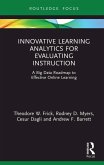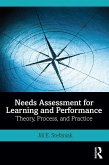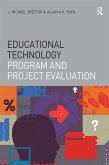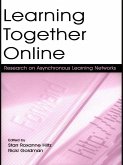J. Michael Spector, Allan H. K. Yuen
Educational Technology Program and Project Evaluation (eBook, PDF)
42,95 €
42,95 €
inkl. MwSt.
Sofort per Download lieferbar

21 °P sammeln
42,95 €
Als Download kaufen

42,95 €
inkl. MwSt.
Sofort per Download lieferbar

21 °P sammeln
Jetzt verschenken
Alle Infos zum eBook verschenken
42,95 €
inkl. MwSt.
Sofort per Download lieferbar
Alle Infos zum eBook verschenken

21 °P sammeln
J. Michael Spector, Allan H. K. Yuen
Educational Technology Program and Project Evaluation (eBook, PDF)
- Format: PDF
- Merkliste
- Auf die Merkliste
- Bewerten Bewerten
- Teilen
- Produkt teilen
- Produkterinnerung
- Produkterinnerung

Bitte loggen Sie sich zunächst in Ihr Kundenkonto ein oder registrieren Sie sich bei
bücher.de, um das eBook-Abo tolino select nutzen zu können.
Hier können Sie sich einloggen
Hier können Sie sich einloggen
Sie sind bereits eingeloggt. Klicken Sie auf 2. tolino select Abo, um fortzufahren.

Bitte loggen Sie sich zunächst in Ihr Kundenkonto ein oder registrieren Sie sich bei bücher.de, um das eBook-Abo tolino select nutzen zu können.
Educational Technology Program and Project Evaluation is a unique, comprehensive guide to the formative and summative evaluation of programs, projects, products, practices and policies involving educational technology.
- Geräte: PC
- mit Kopierschutz
- eBook Hilfe
- Größe: 1.8MB
Andere Kunden interessierten sich auch für
![Innovative Learning Analytics for Evaluating Instruction (eBook, PDF) Innovative Learning Analytics for Evaluating Instruction (eBook, PDF)]() Theodore W. FrickInnovative Learning Analytics for Evaluating Instruction (eBook, PDF)20,95 €
Theodore W. FrickInnovative Learning Analytics for Evaluating Instruction (eBook, PDF)20,95 €![Needs Assessment for Learning and Performance (eBook, PDF) Needs Assessment for Learning and Performance (eBook, PDF)]() Jill E. StefaniakNeeds Assessment for Learning and Performance (eBook, PDF)42,95 €
Jill E. StefaniakNeeds Assessment for Learning and Performance (eBook, PDF)42,95 €![Foundations of Educational Technology (eBook, PDF) Foundations of Educational Technology (eBook, PDF)]() Gwendolyn M. MorelFoundations of Educational Technology (eBook, PDF)49,95 €
Gwendolyn M. MorelFoundations of Educational Technology (eBook, PDF)49,95 €![Educational Technology Program and Project Evaluation (eBook, ePUB) Educational Technology Program and Project Evaluation (eBook, ePUB)]() J. Michael SpectorEducational Technology Program and Project Evaluation (eBook, ePUB)42,95 €
J. Michael SpectorEducational Technology Program and Project Evaluation (eBook, ePUB)42,95 €![Human Specialization in Design and Technology (eBook, PDF) Human Specialization in Design and Technology (eBook, PDF)]() Patricia A. YoungHuman Specialization in Design and Technology (eBook, PDF)39,95 €
Patricia A. YoungHuman Specialization in Design and Technology (eBook, PDF)39,95 €![Teaching Online (eBook, PDF) Teaching Online (eBook, PDF)]() Susan KoTeaching Online (eBook, PDF)45,95 €
Susan KoTeaching Online (eBook, PDF)45,95 €![Learning Together Online (eBook, PDF) Learning Together Online (eBook, PDF)]() Learning Together Online (eBook, PDF)45,95 €
Learning Together Online (eBook, PDF)45,95 €-
-
-
Educational Technology Program and Project Evaluation is a unique, comprehensive guide to the formative and summative evaluation of programs, projects, products, practices and policies involving educational technology.
Dieser Download kann aus rechtlichen Gründen nur mit Rechnungsadresse in A, B, BG, CY, CZ, D, DK, EW, E, FIN, F, GR, HR, H, IRL, I, LT, L, LR, M, NL, PL, P, R, S, SLO, SK ausgeliefert werden.
Produktdetails
- Produktdetails
- Verlag: Taylor & Francis
- Seitenzahl: 208
- Erscheinungstermin: 31. März 2016
- Englisch
- ISBN-13: 9781317530077
- Artikelnr.: 44874171
- Verlag: Taylor & Francis
- Seitenzahl: 208
- Erscheinungstermin: 31. März 2016
- Englisch
- ISBN-13: 9781317530077
- Artikelnr.: 44874171
- Herstellerkennzeichnung Die Herstellerinformationen sind derzeit nicht verfügbar.
J. Michael Spector is Professor and former Chair of the Department of Learning Technologies at the University of North Texas, USA. Dr. Spector has served as Executive Vice President on the International Board of Standards for Training, Performance and Instruction (ibstpi), a member of the Executive Committee of the IEEE Computer Society's Learning Technology Technical Committee, and as President of the Association for Educational and Communications Technology (AECT). He was lead editor on the third and fourth editions of the Handbook of Research on Educational Communications and Technology, edited the Encylopedia of Educational Technology, and has more than 150 journal articles, book chapters, and books to his credit.
Allan H.K. Yuen is Associate Professor, Director of the Centre for Information Technology in Education, and Program Director of the B.Sc. in Information Management in the Division of Information and Technology Studies at the University of Hong Kong. Dr. Yuen is the Editor of the Journal of Communication and Education and has more than 100 publications including journal articles, book chapters, and books. He has served as Vice Chairman of the Hong Kong Educational Research Association (HKERA), and as President of the Hong Kong Association for Educational Communications and Technology (HKAECT).
Allan H.K. Yuen is Associate Professor, Director of the Centre for Information Technology in Education, and Program Director of the B.Sc. in Information Management in the Division of Information and Technology Studies at the University of Hong Kong. Dr. Yuen is the Editor of the Journal of Communication and Education and has more than 100 publications including journal articles, book chapters, and books. He has served as Vice Chairman of the Hong Kong Educational Research Association (HKERA), and as President of the Hong Kong Association for Educational Communications and Technology (HKAECT).
Acknowledgements
Preface
PART I - INTRODUCTION AND OVERVIEW
Chapter 1: The Nature of Learning, Performance, and Instruction
Chapter 2: Projects, Programs, Products, Practice, and Policy
Chapter 3: Evaluation Goals and Scope
Chapter 4: Types of Evaluations
Chapter 5: Major Evaluation Tasks
PART II - AN EVALUATION FRAMEWORK
Chapter 6: Needs Assessment
Chapter 7: Symptoms and Underlying Causes
Chapter 8: A Theory of Change
Chapter 9: Outcome Measures and Indicators
Chapter 10: Mediators, Moderators, and Contextual Factors
PART III - LOGIC MODELS AND IMPLEMENTATIONS
Chapter 11: Interventions and Implementation Plans
Chapter 12: Developing a Logic Model
Chapter 13: Identifying Indicators and Measurements
Chapter 14: Measurement Instrumentation and Protocols
Chapter 15: Fidelity of Implementation Plans
PART IV - TRANSLATING PLANS INTO ACTIONS
Chapter 16: Milestones for Effective Technology Integration
Chapter 17: Ongoing Formative Evaluations
Chapter 18: Dynamic Improvements to Ensure Success
Chapter 19: Collecting and Analyzing Data
Chapter 20: Informing and Improving Policy Implementation
Chapter 21: Documenting, Reporting, and Recommending
PART V - ADDITIONAL RESOURCES
Glossary of Terms
Consolidated References
Appendix A: A Sample Evaluation Plan
Appendix B: Professional Evaluation Associations
Appendix C: Peer-Reviewed Evaluation Journals
Index
Preface
PART I - INTRODUCTION AND OVERVIEW
Chapter 1: The Nature of Learning, Performance, and Instruction
Chapter 2: Projects, Programs, Products, Practice, and Policy
Chapter 3: Evaluation Goals and Scope
Chapter 4: Types of Evaluations
Chapter 5: Major Evaluation Tasks
PART II - AN EVALUATION FRAMEWORK
Chapter 6: Needs Assessment
Chapter 7: Symptoms and Underlying Causes
Chapter 8: A Theory of Change
Chapter 9: Outcome Measures and Indicators
Chapter 10: Mediators, Moderators, and Contextual Factors
PART III - LOGIC MODELS AND IMPLEMENTATIONS
Chapter 11: Interventions and Implementation Plans
Chapter 12: Developing a Logic Model
Chapter 13: Identifying Indicators and Measurements
Chapter 14: Measurement Instrumentation and Protocols
Chapter 15: Fidelity of Implementation Plans
PART IV - TRANSLATING PLANS INTO ACTIONS
Chapter 16: Milestones for Effective Technology Integration
Chapter 17: Ongoing Formative Evaluations
Chapter 18: Dynamic Improvements to Ensure Success
Chapter 19: Collecting and Analyzing Data
Chapter 20: Informing and Improving Policy Implementation
Chapter 21: Documenting, Reporting, and Recommending
PART V - ADDITIONAL RESOURCES
Glossary of Terms
Consolidated References
Appendix A: A Sample Evaluation Plan
Appendix B: Professional Evaluation Associations
Appendix C: Peer-Reviewed Evaluation Journals
Index
Acknowledgements
Preface
PART I - INTRODUCTION AND OVERVIEW
Chapter 1: The Nature of Learning, Performance, and Instruction
Chapter 2: Projects, Programs, Products, Practice, and Policy
Chapter 3: Evaluation Goals and Scope
Chapter 4: Types of Evaluations
Chapter 5: Major Evaluation Tasks
PART II - AN EVALUATION FRAMEWORK
Chapter 6: Needs Assessment
Chapter 7: Symptoms and Underlying Causes
Chapter 8: A Theory of Change
Chapter 9: Outcome Measures and Indicators
Chapter 10: Mediators, Moderators, and Contextual Factors
PART III - LOGIC MODELS AND IMPLEMENTATIONS
Chapter 11: Interventions and Implementation Plans
Chapter 12: Developing a Logic Model
Chapter 13: Identifying Indicators and Measurements
Chapter 14: Measurement Instrumentation and Protocols
Chapter 15: Fidelity of Implementation Plans
PART IV - TRANSLATING PLANS INTO ACTIONS
Chapter 16: Milestones for Effective Technology Integration
Chapter 17: Ongoing Formative Evaluations
Chapter 18: Dynamic Improvements to Ensure Success
Chapter 19: Collecting and Analyzing Data
Chapter 20: Informing and Improving Policy Implementation
Chapter 21: Documenting, Reporting, and Recommending
PART V - ADDITIONAL RESOURCES
Glossary of Terms
Consolidated References
Appendix A: A Sample Evaluation Plan
Appendix B: Professional Evaluation Associations
Appendix C: Peer-Reviewed Evaluation Journals
Index
Preface
PART I - INTRODUCTION AND OVERVIEW
Chapter 1: The Nature of Learning, Performance, and Instruction
Chapter 2: Projects, Programs, Products, Practice, and Policy
Chapter 3: Evaluation Goals and Scope
Chapter 4: Types of Evaluations
Chapter 5: Major Evaluation Tasks
PART II - AN EVALUATION FRAMEWORK
Chapter 6: Needs Assessment
Chapter 7: Symptoms and Underlying Causes
Chapter 8: A Theory of Change
Chapter 9: Outcome Measures and Indicators
Chapter 10: Mediators, Moderators, and Contextual Factors
PART III - LOGIC MODELS AND IMPLEMENTATIONS
Chapter 11: Interventions and Implementation Plans
Chapter 12: Developing a Logic Model
Chapter 13: Identifying Indicators and Measurements
Chapter 14: Measurement Instrumentation and Protocols
Chapter 15: Fidelity of Implementation Plans
PART IV - TRANSLATING PLANS INTO ACTIONS
Chapter 16: Milestones for Effective Technology Integration
Chapter 17: Ongoing Formative Evaluations
Chapter 18: Dynamic Improvements to Ensure Success
Chapter 19: Collecting and Analyzing Data
Chapter 20: Informing and Improving Policy Implementation
Chapter 21: Documenting, Reporting, and Recommending
PART V - ADDITIONAL RESOURCES
Glossary of Terms
Consolidated References
Appendix A: A Sample Evaluation Plan
Appendix B: Professional Evaluation Associations
Appendix C: Peer-Reviewed Evaluation Journals
Index







